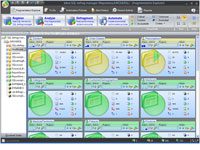Free Trial
Explore all the products and find the right solution for your business
Resources
Events
Free Trial
Explore all the products and find the right solution for your business
Database
Applications
Free Trial
Explore all the products and find the right solution for your business
SQL Diagnostic Manager
- Proactively manage server performance on-prem or in the cloud with timely alerts and analytics
SQL Compliance Manager
- Fast configuration of regulatory and audit compliance settings with proactive monitoring, alerts, and reporting
SQL Secure
- Automated database security, monitoring and management for MS SQL, Azure and Amazon RDS for SQL Server
SQL Safe Backup
- Backup and instant recovery for SQL Server, Azure Blob Storage and Amazon S3
SQL Inventory Manager
- Discover, track and manage database inventory across the entire environment
SQL Admin Toolset
- 24 Essential tools to simplify daily server administration
Cross-Platform Product

